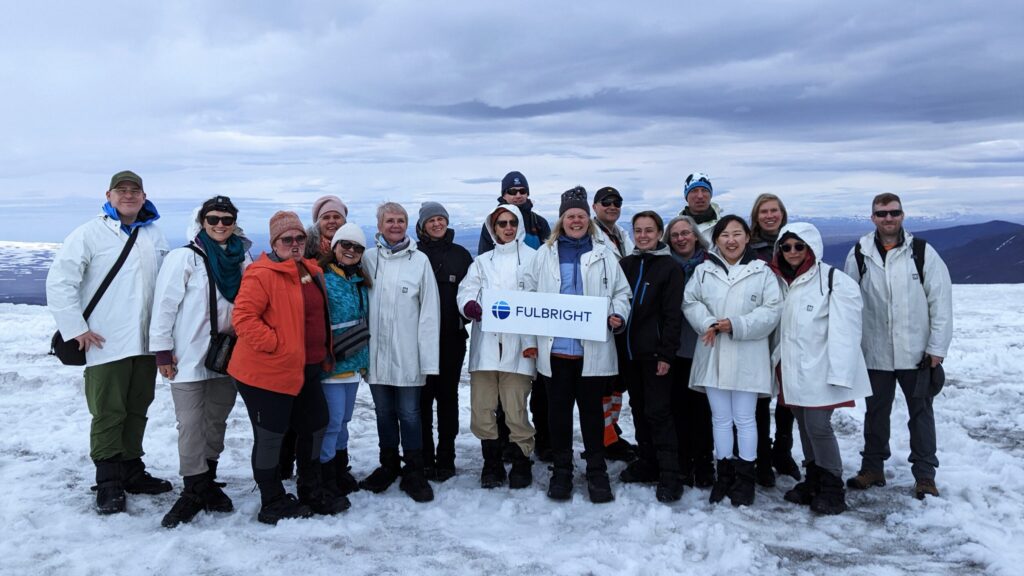
For the past two years, Fulbright Arctic Initiative Scholars from the eight Arctic nations – Canada, the Kingdom of Denmark, Finland, Iceland, Norway, Russia, Sweden, and the United States — have been working together to address shared challenges and opportunities through collaborative research.
From April 24-28, 2023, these scholars will gather in Washington, D.C. along with other experts and government officials from the Arctic nations to present their work, provide policy recommendations, and discuss how they will continue their collaboration on future projects.
The Fulbright Program will celebrate the conclusion of this project with a series of events throughout the week, and we invite you to engage with the program virtually and in person throughout the week.
Events
Fulbright Arctic Initiative Poster Exhibition
April 25, 2:00-4:00 pm (EDT)
Smithsonian National Museum of Natural History
The nineteen researchers and two co-lead scholars will be at the National Museum of Natural History to speak with visitors and display and discuss key findings from their Fulbright research over the past year. The exhibition will be held in the Ocean Hall of the museum and is free and open to the public.
Fulbright Arctic Initiative Symposium – Science Diplomacy in the Arctic
April 27, 2:00-4:00 pm (EDT)
The Wilson Center, Polar Institute
Fulbright Initiative Scholars will present public policy recommendations that emerged from their collaborative work and discuss the Indigenous foundations of Arctic knowledge.
Invitations are required to attend the event in person. A live stream of the event will be available to the public. Register for the public livestream.
More About the Fulbright Arctic Initiative
Launched in 2015 to coincide with the U.S. chairmanship of the Arctic Council, the Fulbright Arctic Initiative reinforces U.S. priorities by supporting international scientific cooperation on Arctic issues and increasing mutual understanding between the people of the United States and the people of other countries. The Fulbright Arctic Initiative forges lasting connections among the Arctic scholars and their nations as they work together toward common goals.
The Fulbright Arctic Initiative is part of the Fulbright Program, the U.S. government’s flagship international educational exchange program, which is funded through an annual appropriation made by the U.S. Congress to the U.S. Department of State’s Bureau of Educational and Cultural Affairs. Participating governments and host institutions, corporations, and foundations around the world also provide direct and indirect support to the Program. Since 1946, the Fulbright Program has provided more than 400,000 participants from more than 160 countries with the opportunity to study, teach and conduct research, exchange ideas and contribute to finding solutions to shared international concerns.
The Fulbright Arctic Initiative forges lasting connections among the Arctic scholars and their nations as they work together toward common goals.
Find out more about the Fulbright Arctic Initiative.
Who are the Fulbright Arctic Initiative Scholars?
The current group of nineteen scholars is the third cohort of Fulbright Arctic Initiative Scholars, representing the eight countries that make up the Arctic Council: Canada, the Kingdom of Denmark, Finland, Iceland, Norway, Russia, Sweden, and the United States. They are led by two notable Arctic experts, Dr. Greg Poelzer, a Professor in the School of Environment and Sustainability (SENS) at the University of Saskatchewan, and Dr. Elizabeth Rink, Professor of Community Health in the Department of Health and Human Development at Montana State University, both of whom are alumni of the Fulbright Arctic Initiative.
Fulbright Arctic Initiative Scholars conducted research in the areas of Arctic security and cooperation, Arctic infrastructure in a changing environment, and the community dimensions of health. They covered a wide range of topics, including engaging local and Indigenous knowledge towards human, environmental and food security; exposure to toxic chemicals in the Faroe Islands; community-based solutions to Indigenous health and elder care in Alaska; environmental change resilience; sustainable development; and the role of the arts in Arctic communities.
Co-Lead Scholars
Dr. Greg Poelzer – University of Saskatchewan
Dr. Elizabeth Rink – Montana State University
Fulbright Arctic Initiative Scholars
Dr. Bonita Beatty – University of Saskatchewan, Canada
Dr. Lill Bjørst – Aalborg University, Denmark
Mr. Chris Clarke McQueen – Government of the Northwest Territories, Canada
Dr. Susan Crate – George Mason University, United States
Ms. Jaime DeSimone – Farnsworth Art Museum, United States
Dr. Jessica Graybill – Colgate University, United States
Dr. Elena Grigorieva – Innovative Water and Environmental Solutions, Germany
Dr. Ketil Lenert Hansen UiT The Arctic University of Norway and Sami University of Applied Sciences, Norway
Dr. Andrea Kraj – CORE Renewable Energy Inc., Canada
Dr. Sigríður Kristjánsdóttir – Agricultural University of Iceland
Dr. Anna Krook Riekkola – Luleå University of Technology, Sweden
Dr. Rauna Kuokkanen – University of Lapland, Finland
Mr. Peter Wilhelm Linde – Ministry of Foreign Affairs of the Kingdom of Denmark
Dr. Rainer Lohmann – University of Rhode Island, United States
Dr. Andreas Østhagen – Fridtjof Nansen Institute, Norway
Dr. Silja Omarsdóttir – University of Iceland
Ms. Lena Popova – North-Eastern Federal University, Russia
Dr. Anu-Sisko Soikkeli – University of Oulu, Finland
Dr. Kristopher Thornburg – United States Coast Guard
Meet the Fulbright Arctic Initiative Scholars.